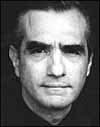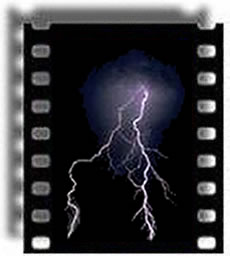
|
|
Martin Scorsese
|
|
17 November 1942
|
|
Queens, New York, USA
|
|
Director, actor, writer, producer. (b. Nov. 17, 1942, Flushing (Queens), N.Y.) The man often referred to as America's best
movie director, as well as one of the cinema's most dedicated preservationists, grew up in Manhattan's Little Italy, and his experiences there inform most of his early work.
Although at one point he entered a seminary, hoping to become a priest, moviemaking proved a stronger calling. In the early 1960s he was in the film studies program at New York
University, where he eventually became an instructor. He first attracted notice in the film community with his provocative short subjects What's a Nice Girl Like You Doing in a
Place Like This? (1963), It's Not Just You, Murray! (1964), and The Big Shave (1967), the latter two winning berths at the New York Film Festival.
In 1968 he attempted his first feature film, Who's That Knocking at My Door? (with Harvey Keitel), then agreed to work as an assistant
director and editor on the groundbreaking musical documentary Woodstock (1970). He served as supervising editor on Medicine Ball Caravan (1971) and Unholy Rollers (1972); then
producer Roger Corman hired him to direct Boxcar Bertha (1972). Scorsese managed to imbue the low-budget actioner with several personal touches (including a crucifixion scene that
is reprised almost shot for shot in 1988's The Last Temptation of Christ even while meeting Corman's sex and violence quotas. After getting berated by friend John Cassavetes for
spending "a year of your life making a piece of s--" he decided to direct a film that mattered to him. The result was the powerful Mean Streets (1973), a Little Italy slice of
life in which the extremely confused protagonist (Harvey Keitel) tries to take care of too many people, with disastrous results. The film marked the first collaboration between
Scorsese and an electrifying young actor named Robert De Niro, and it brought them both widespread acclaim. (Even after achieving some degree of mainstream success, Scorsese
continued making highly personal documentaries like Italianamerican in 1974, a film about his parents, and American Boy: A Profile of Steven Prince in 1978.)
Although his next film, Alice Doesn't Live Here Anymore (1974), was a critical and commercial hit, it took 1976's widely
misunderstood Taxi Driver to bring Scorsese into his own. This nightmare vision of New York and a disturbed loner's self-appointed mission in the urban jungle generated a lot of
controversy, and unfortunately provided some fuel for real-life disturbed loner John Hinckley, Jr., who maintained his 1981 attempt on President Reagan's life was inspired by an
obsession with Taxi Driver actress Jodie Foster. 1977's big-budget musical, New York, New York with visuals inspired by Vincente Minnelli (his daughter Liza was one of the film's
stars) and histrionics inspired by the Lee Strasberg school, was a bit of a misfire, but showed Scorsese's deeply felt love for old Hollywood movies from which uninformed viewers
saw his films as such radical departures. In fact, Scorsese builds on cinematic tradition as much as he subverts it, and will in any given interview name dozens of formative
influences from Hollywood and elsewhere.
The Last Waltz (1978), chronicling an all-star send-off to the influential rock group The Band, is arguably the finest concert
movie ever made, thanks to Scorsese's mapping out camera movements in advance of the show itself and editing with great musical sense. Raging Bull (1980), now acclaimed by critics
as the decade's greatest movie, was a blackand-white powerhouse that saw Robert De Niro undergo an amazing physical transformation to play middleweight champion Jake LaMotta in
both his prime and in older, bloated form (production had to halt for several months in order for De Niro to put on the necessary weight). The film's amazing boxing sequences,
overall visual style, and overwhelming dramatic impact made this story of a seemingly irredeemable brute an unforgettable film. It earned eight Oscar nominations, including Best
Picture and Director, and won for Best Actor and Best Editing; it was bested by the much more genteel Ordinary People The 1980s also saw Scorsese experiment with quirky, very
black comedythe amazing, unsettling terror-of-celebrity picture The King of Comedy (1983) and the nightmare date movie After Hours (1985)-and conventional Hollywood forms-The
Color of Money (1986), a kinetic sequel to The Hustler starring Paul Newman and Tom Cruise.
Scorsese's final film of the decade, The Last Temptation of Christ (1988), was his most controversial. Adapted from Greek
author Nikos Kazantzakis' novel, it represented Scorsese's sincere, reverent attempt to humanize Christ-and was almost shut down by protests from Fundamentalist Christians (most
of whom hadn't even seen the movie) on release. It still managed to earn Scorsese a Best Director nomination. (Scorsese had tried to make the picture earlier in the decade, but
backing studio Paramount, fearing Fundamentalist backlash, canceled the production right before shooting was scheduled to start.) Scorsese didn't let the controversy keep him out
of action; in 1989 he contributed the best episode to the three-part anthology film New York Stories (which also featured work from Woody Allen and Francis Ford Coppola). 1990's
GoodFellas (Oscar-nominated for Best Picture, Director, and Screenplay, which Scorsese cowrote), a dizzying, exhilarating, frightening look at the everyday life of a Mafia
"wiseguy," won wide acclaim and also reunited Scorsese and De Niro for the sixth time. They continued the collaboration with the 1991 remake of Cape Fear another attempt for
Scorsese (perpetually a Hollywood outsider) to crack the mainstream. Even with Steven Spielberg as executive producer, the film managed to reflect Scorsese's darker vision, and
emerged a curious hybrid of conventional 1990s horror/thriller and brooding psychological melodrama. Then in 1993 he turned to wholly unexpected source material, Edith Wharton's
novel of sexual repression in the late 1800s, The Age of Innocencea flawed but stunningly realized evocation of an era and its social mores. (Scorsese received an Oscar nomination
as cowriter.) He teamed up again with DeNiro-their eighth time-for Casino (1995).
Scorsese has also directed Michael Jackson's music video "Bad" (1987), and Robbie Robertson's "Somewhere Down the Crazy River"
(1988), as well as two Giorgio Armani commercials and an episode of Steven Spielberg's "Amazing Stories" called "Mirror Mirror." He produced The Grifters (1990), coproduced Mad
Dog and Glory (1993) and Clockers (1995), and executive produced Naked in New York (1994). He has lent his name and prestige to a number of American theatrical releases of both
contemporary and classic films, and even interviewed one of his mentors, director Michael Powell, for the laserdisc release of Black Narcissus
The director has also worked in front of the camera, contributing cameos to a number of his own movies (most notably Taxi
Driver as a psycho passenger) and working as an actor in such films as Round Midnight (1986), Akira Kurosawa's Dreams (1990, as Vincent van Gogh), Guilty by Suspicion (1991), and
Quiz Show (1994). Most of his movies involve extended family participation, not only with longtime collaborators like actors De Niro, Harvey Keitel, and Joe Pesci, screenwriters
Paul Schrader, Mardik Martin and Jay Cocks, editor Thelma Schoonmaker, and cinematographer Michael Ballhaus, but in his frequent casting of his parents in actual roles. Mrs.
Scorsese had a particularly memorable scene as Joe Pesci's mother in GoodFellas Scorsese was formerly married to actress Isabella Rossellini and producer Barbara De
Fina.
Scorsese - his works as a Director
-
Gangs of New York (2001)
-
Bringing Out the Dead (1999)
-
Dolce cinema, Il (1999) (TV)
-
Kundun (1997)
-
Personal Journey with Martin Scorsese Through American Movies, A
(1995) (TV)
-
Casino (1995)
-
Age of Innocence, The (1993)
-
Cape Fear (1991)
-
Goodfellas (1990)
-
Made in Milan (1990)
-
New York Stories (1989) (segment 1)
-
Last Temptation of Christ, The (1988)
-
Bad (1987) (V)
-
Color of Money, The (1986)
-
After Hours (1985)
-
"Amazing Stories" (1985) TV Series (episode
"Mirror, Mirror (1986)")
-
King of Comedy, The (1983)
-
Raging Bull (1980)
-
American Boy: A Profile of: Steven Prince (1978)
-
Last Waltz, The (1978)
-
New York, New York (1977)
-
Taxi Driver (1976)
-
Alice Doesn't Live Here Anymore (1974)
-
Italianamerican (1974)
-
Mean Streets (1973)
-
Badge 373 (1973) (some scenes)
-
Boxcar Bertha (1972)
-
-
Who's That Knocking at My Door? (1968)
-
Big Shave, The (1967)
-
It's Not Just You, Murray! (1964)
-
What's a Nice Girl Like You Doing in a Place Like This?
(1963)
-
Vesuvius VI (1959)
|




